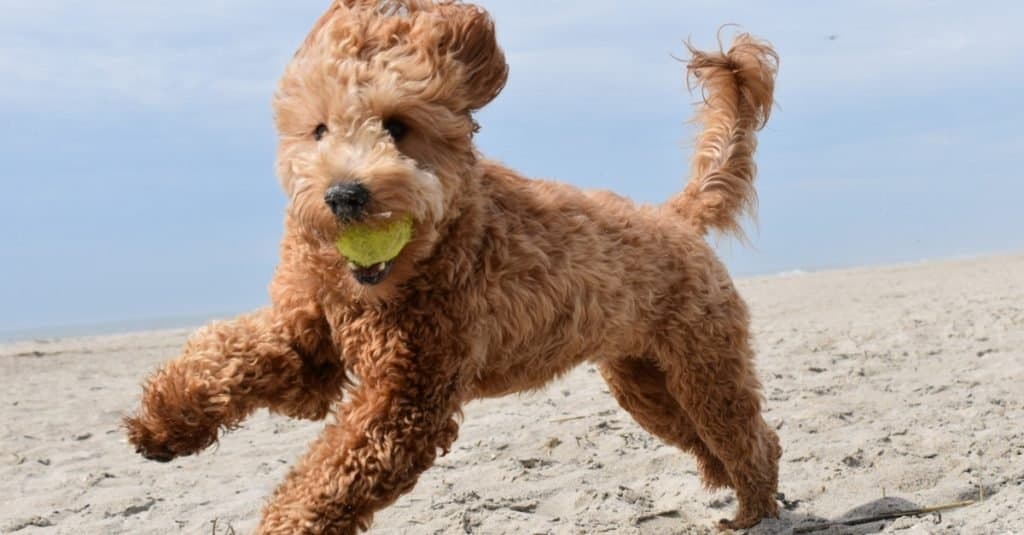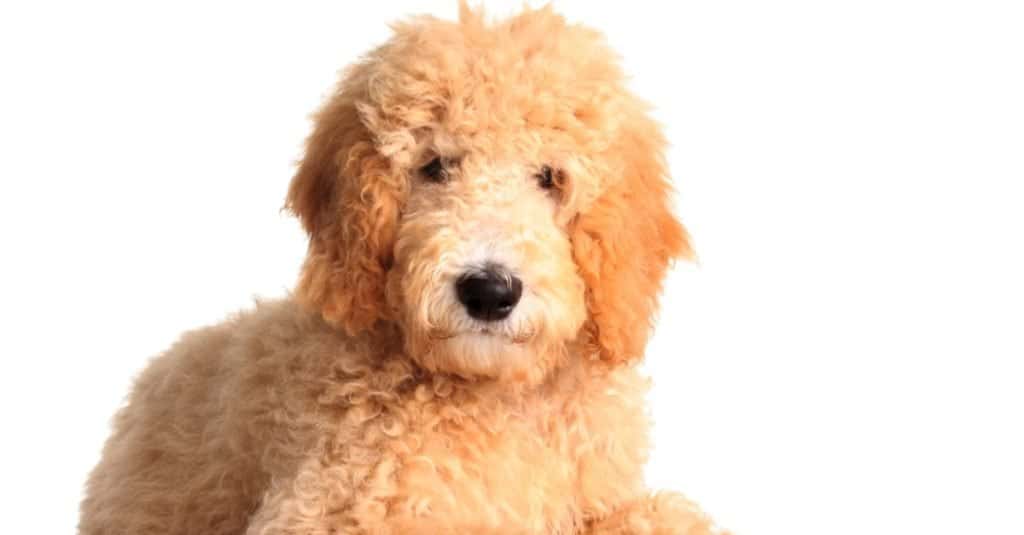If you are thinking of welcoming an adorable goldendoodle into your home, then you are certainly not alone! Goldendoodles are the 9th most popular dog breed in the United States. Many future doodle owners research all there is to know about adopting one of these treasured pups.
Most would-be-owners’ questions revolve around the doodle’s coat and shedding frequency. Many people believe that the goldendoodle does not shed at all, but this is not true.
There are plenty of misconceptions when it comes to the doodle’s coat, so we’re here to clear up any rumors and share the facts! Let’s find out how much a goldendoodle actually sheds and discuss some tips on how to care for their coat!
Get To Know the Goldendoodle’s Coat

You can typically expect your goldendoodle’s coat to be anywhere from wavy to curly in appearance.
©W.H. Photography/Shutterstock.com
Goldendoodles display adorable shaggy waves. They are a wonderful combination of their curly and wavy-haired parents. However, since this popular breed is mixed, there is no way to know which parent they will take after more.
Though each goldendoodle’s coat can vary a bit, there are a few coat traits you can typically expect. You can typically expect your goldendoodle’s coat to be anywhere from wavy to curly in appearance. Their coats are usually soft. The coat may even be plush or dense if the pup has more traits of the poodle parent.
Many future doodle parents ask if the goldendoodle has a double coat. There is no way to answer this question with certainty because these dogs are a mixed breed. The golden retriever has a dense double coat, but the poodle has a single coat. Since the goldendoodle is a combination of two breeds, there is no way to know which parent they will favor more. You cannot be certain about coat type until your doodle reaches one year of age. Their coat can endure many changes throughout their first year of life.
How Much Do Goldendoodles Shed?
Now that you have a better understanding of the goldendoodle‘s coat, we can talk about their shedding frequency. The goldendoodle is typically a low-shedding breed, but it can vary slightly from dog to dog. There is no concrete standard, but it is safe to say that they will not shed often.
However, while goldendoodles are not heavy shedders, this does not mean they don’t shed at all. There are many misconceptions about the goldendoodle breed, and the most common ones revolve around their coat. Many continue to state that the goldendoodle does not shed at all, and this is simply untrue. Every animal will shed hair or fur due to the natural aging process of their hair. It is impossible to avoid shedding completely.
Are Goldendoodles Hypoallergenic?
Many also state that the goldendoodle is hypoallergenic and perfect for those with dog allergies. However, it is impossible for a dog to be 100% hypoallergenic. This is due to the fact that the fur itself is not the cause of dog allergies in humans. The proteins found in their dander are the culprit.
Even if a dog does not shed, he will still shed a bit of dander around your home. In addition to this, most pet parents will come in contact with their dog’s saliva each day. This saliva may come from petting recently licked areas of the dog’s body or picking up toys. If you have a canine allergy, then the proteins in their saliva can trigger your symptoms as well.
The goldendoodle is better for those with dog allergies due to the fact that they produce less pet dander. But they are not 100% hypoallergenic. Your allergies might be less noticeable around Goldendoodles, but you may still have allergy symptoms from time to time.
Why Is My Goldendoodle Shedding So Much?

If your goldendoodle is between the ages of six months to one year, it is possible that his increased fur loss is due to shedding his puppy coat.
©Hannamariah/Shutterstock.com
Since goldendoodles are low shedding, you may be confused when your doodle suddenly sheds more than usual. Let’s break down the possible causes below!
Your goldendoodle is shedding her puppy coat:
If your goldendoodle is between six months to one-year, increased fur loss is due to shedding her puppy coat. All dogs will experience changes in coat during the transition from puppyhood to adulthood. This will often lead to increased shedding during this period. Thankfully, this high shedding period only lasts about a month.
Your goldendoodle is blowing his coat:
If your goldendoodle has a double coat, he will blow his coat a couple times each year. This refers to increased shedding as the coat prepares for the upcoming season. This typically takes place during the spring and fall months.
Your goldendoodle is experiencing a hormonal shift:
If your goldendoodle is not yet spayed, then you may notice increased shedding while she is in heat. She can also experience increased fur loss after birthing or nursing puppies. This is all tied to hormonal changes within her body.
Your goldendoodle has fleas, ticks, or skin mites:
Ectoparasites like fleas, ticks, or skin mites can lead to increased shedding in your beloved goldendoodle. These skin critters can cause major itchiness for your pup, and this will lead to scratching or biting. The skin irritation from his constant biting and scratching will cause him to shed more hair than usual. And he may even develop bald spots because of it. Signs of ectoparasites in goldendoodles include itchy skin, redness, patches of fur loss, flea dirt throughout the fur, and infections.
Your goldendoodle has skin allergies:
Unfortunately for our goldendoodle friends, they are prone to developing skin allergies. Allergies can lead to significant skin irritation for these pups, often causing them to shed much more than usual. Evidence of skin allergies include itching, redness, sores, excessive shedding, fur loss, dry skin, and even chronic ear infections.
If you are worried about the cause of your goldendoodle’s increased shedding, we suggest calling your vet. Excessive shedding or fur loss is not normal for goldendoodles. It’s always best to seek guidance from your trusted vet in these situations.
Final Thoughts
Goldendoodles are popular not only for their adorable looks, but also for the fact that they are considered low shedding. While you can never eliminate shedding completely, this breed is great for those that are sensitive to dander.
The photo featured at the top of this post is © cine-nomadic/Shutterstock.com
Ready to discover the top 10 cutest dog breeds in the entire world?
How about the fastest dogs, the largest dogs and those that are -- quite frankly -- just the kindest dogs on the planet? Each day, AZ Animals sends out lists just like this to our thousands of email subscribers. And the best part? It's FREE. Join today by entering your email below.
Thank you for reading! Have some feedback for us? Contact the AZ Animals editorial team.






